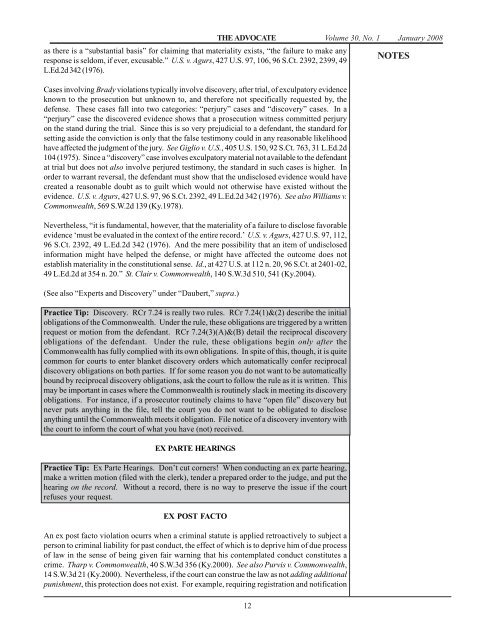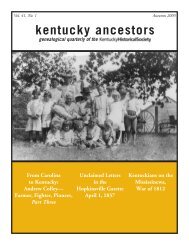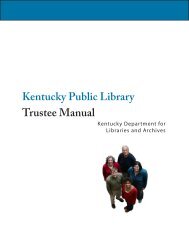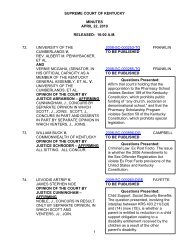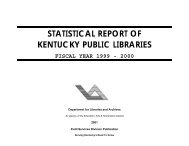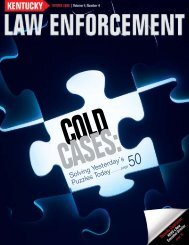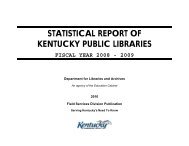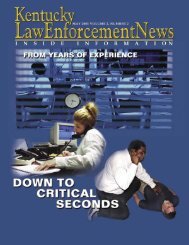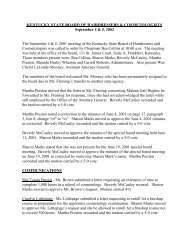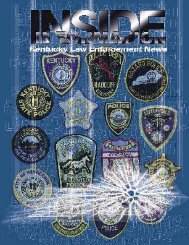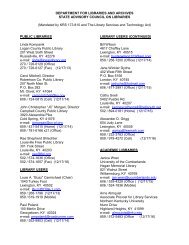Jan08 Advo.pmd - e-archives Home
Jan08 Advo.pmd - e-archives Home
Jan08 Advo.pmd - e-archives Home
You also want an ePaper? Increase the reach of your titles
YUMPU automatically turns print PDFs into web optimized ePapers that Google loves.
THE ADVOCATE Volume 30, No. 1 January 2008<br />
as there is a “substantial basis” for claiming that materiality exists, “the failure to make any<br />
response is seldom, if ever, excusable.” U.S. v. Agurs, 427 U.S. 97, 106, 96 S.Ct. 2392, 2399, 49<br />
L.Ed.2d 342 (1976).<br />
Cases involving Brady violations typically involve discovery, after trial, of exculpatory evidence<br />
known to the prosecution but unknown to, and therefore not specifically requested by, the<br />
defense. These cases fall into two categories: “perjury” cases and “discovery” cases. In a<br />
“perjury” case the discovered evidence shows that a prosecution witness committed perjury<br />
on the stand during the trial. Since this is so very prejudicial to a defendant, the standard for<br />
setting aside the conviction is only that the false testimony could in any reasonable likelihood<br />
have affected the judgment of the jury. See Giglio v. U.S., 405 U.S. 150, 92 S.Ct. 763, 31 L.Ed.2d<br />
104 (1975). Since a “discovery” case involves exculpatory material not available to the defendant<br />
at trial but does not also involve perjured testimony, the standard in such cases is higher. In<br />
order to warrant reversal, the defendant must show that the undisclosed evidence would have<br />
created a reasonable doubt as to guilt which would not otherwise have existed without the<br />
evidence. U.S. v. Agurs, 427 U.S. 97, 96 S.Ct. 2392, 49 L.Ed.2d 342 (1976). See also Williams v.<br />
Commonwealth, 569 S.W.2d 139 (Ky.1978).<br />
Nevertheless, “it is fundamental, however, that the materiality of a failure to disclose favorable<br />
evidence ‘must be evaluated in the context of the entire record.’ U.S. v. Agurs, 427 U.S. 97, 112,<br />
96 S.Ct. 2392, 49 L.Ed.2d 342 (1976). And the mere possibility that an item of undisclosed<br />
information might have helped the defense, or might have affected the outcome does not<br />
establish materiality in the constitutional sense. Id., at 427 U.S. at 112 n. 20, 96 S.Ct. at 2401-02,<br />
49 L.Ed.2d at 354 n. 20.” St. Clair v. Commonwealth, 140 S.W.3d 510, 541 (Ky.2004).<br />
(See also “Experts and Discovery” under “Daubert,” supra.)<br />
Practice Tip: Discovery. RCr 7.24 is really two rules. RCr 7.24(1)&(2) describe the initial<br />
obligations of the Commonwealth. Under the rule, these obligations are triggered by a written<br />
request or motion from the defendant. RCr 7.24(3)(A)&(B) detail the reciprocal discovery<br />
obligations of the defendant. Under the rule, these obligations begin only after the<br />
Commonwealth has fully complied with its own obligations. In spite of this, though, it is quite<br />
common for courts to enter blanket discovery orders which automatically confer reciprocal<br />
discovery obligations on both parties. If for some reason you do not want to be automatically<br />
bound by reciprocal discovery obligations, ask the court to follow the rule as it is written. This<br />
may be important in cases where the Commonwealth is routinely slack in meeting its discovery<br />
obligations. For instance, if a prosecutor routinely claims to have “open file” discovery but<br />
never puts anything in the file, tell the court you do not want to be obligated to disclose<br />
anything until the Commonwealth meets it obligation. File notice of a discovery inventory with<br />
the court to inform the court of what you have (not) received.<br />
EX PARTE HEARINGS<br />
Practice Tip: Ex Parte Hearings. Don’t cut corners! When conducting an ex parte hearing,<br />
make a written motion (filed with the clerk), tender a prepared order to the judge, and put the<br />
hearing on the record. Without a record, there is no way to preserve the issue if the court<br />
refuses your request.<br />
EX POST FACTO<br />
An ex post facto violation ocurrs when a criminal statute is applied retroactively to subject a<br />
person to criminal liability for past conduct, the effect of which is to deprive him of due process<br />
of law in the sense of being given fair warning that his contemplated conduct constitutes a<br />
crime. Tharp v. Commonwealth, 40 S.W.3d 356 (Ky.2000). See also Purvis v. Commonwealth,<br />
14 S.W.3d 21 (Ky.2000). Nevertheless, if the court can construe the law as not adding additional<br />
punishment, this protection does not exist. For example, requiring registration and notification<br />
12<br />
NOTES


